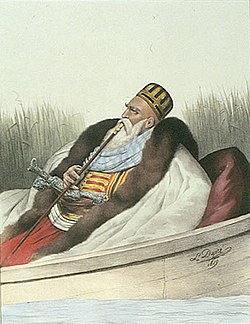Ali Pasha of Yanina
|
His Excellency Ali Pasha |
|
|---|---|
 |
|
| Pasha of Yanina | |
|
In office 1788–1822 |
|
| Personal details | |
| Born | 1740 Beçisht, Ottoman Empire (now Albania) |
| Died | 1822 (aged 81–82) Ioannina, Ottoman Empire (now Greece) |
| Parents | Veli bey and Hanka |
| Religion | Islam |
| Nickname(s) |
"Aslan" (Turkish: Lion) "Lion of Yannina" |
Ali Pasha, variously referred to as of Tepelena or of Janina/Yannina/Ioannina, Aslan, "the Lion", or the Lion of Yannina (1740 – 24 January 1822), was an Ottoman Albanian ruler who served as an Ottoman pasha of the western part of Rumelia, the Ottoman Empire's European territory, which was referred to as the Pashalik of Yanina. His court was in Ioannina, and the territory he governed incorporated most of Epirus and the western parts of Thessaly and Greek Macedonia in Northern Greece. Ali had three sons: Muhtar Pasha (served in the 1809 war against the Russians), Veli Pasha of Morea and Salih Pasha of Vlore.
Ali first appears in historical accounts as the leader of a band of brigands who became involved in many confrontations with Ottoman state officials in Albania and Epirus. He joined the administrative-military apparatus of the Ottoman Empire, holding various posts until 1788 when he was appointed pasha, ruler of the sanjak of Ioannina. His diplomatic and administrative skills, his interest in modernist ideas and concepts, his popular religiousness, his religious neutrality, his win over the bands terrorizing the area, his revengefulness and harshness in imposing law and order, and his looting practices towards persons and communities in order to increase his proceeds cause both the admiration and the criticism of his contemporaries, as well as an ongoing controversy among historians regarding his personality. Ali Pasha of Tepelena died in 1822 at the age of 81 or 82.
His name in the local languages were: Albanian: Ali Pashë Tepelenjoti; Aromanian: Ali Pãshelu; Greek: Αλή Πασάς Τεπελενλής Ali Pasas Tepelenlis or Αλή Πασάς των Ιωαννίνων Ali Pasas ton Ioanninon (Ali Pasha of Ioannina); and Turkish: Tepedelenli Ali Paşa.
...
Wikipedia
